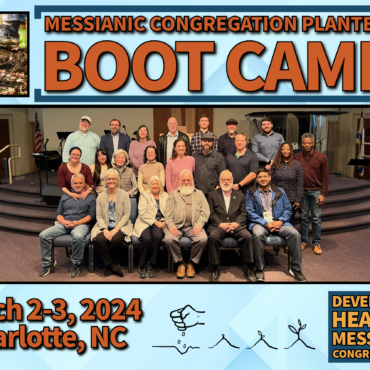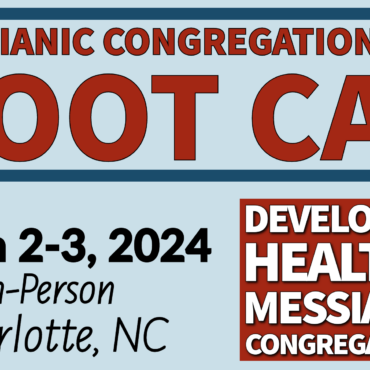To Serve as a Leader
At Word of Messiah, we want to see more outreach happening among Jewish people, and more Messianic congregations being planted, so that God’s faithfulness in Messiah can be more effectively communicated to the Jewish community. Why then, don’t we spend all our time on evangelism; why do we also take time teaching and training people who are already believers? The reason is this: only properly discipled and trained Messianic leaders are going to have a ministry of effective evangelism and discipleship. You can’t give what you don’t have; a leader must model the values he expects those in his community to live by.
When Sam was asked to be the guest speaker at Ariel Ministries’ Messianic Servant Leadership Conference, he gladly accepted the invitation as an opportunity to invest in Messianic leaders, coming alongside them in the development of long-range evangelism and congregation planting efforts in Texas and surrounding states. Ariel Ministries graciously welcomed Sam and Miriam to their San Antonio, TX headquarters on Friday, April 17th for the weekend conference. Miriam was able to come with Sam in order to minister to the wives of the leaders, and to lead worship for the different sessions.
After the conference opened with worship and prayer, Sam challenged the leaders with a biblical principle that stands in contradiction to what we are taught by our culture: Leadership is not based on having an alpha personality, but on agreed responsibility. In Scripture, we see that God called many different types of people to be leaders (Moses, Nehemiah, Paul, Timothy…). Leaders are not to be dominated by their personality, but only by Yeshua’s leadership, that they may be like Him in all ways in order to become all things to all people. We see throughout God’s Word that the terms “elder” or “overseer” were only a description of a person’s responsibility, not a title or status symbol.
Sam took time to describe the qualities that godly leaders are to have and the responsibilities they are to carry out. True leadership is perfectly modeled in Yeshua, who came “not to be served, but to serve” (Mark 10:45) Likewise, human leaders are not to rule with an iron fist, but lead as servants; loving, encouraging, and caring for those they are privileged to lead (Mark 9:35). I John 4:17 states, “As He is, so also are we in the world”; we who follow Him live out His values. What we believe impacts what we value, and this impacts what we do. Leadership models the values that God would have in His community to demonstrate His faithfulness and love.
Yeshua is our perfect Priest, Prophet, and King. A leader demonstrates these roles as he leads his congregation in prayer (role of priest), in the ministry of the Word (role of prophet), and in wise management as an overseer (role of king). As an overseer, a shepherd must know where he’s taking his flock. He plans for his community to grow first through contact making (evangelism), then disciple making, member making, and finally leader making.
Why does God talk so much about leadership in the context of congregations? God’s love is best revealed through a healthy community, as those created in His image reveal His nature through loving one another. Before synagogues or churches existed, there were communities, and elders of these communities. God looks upon congregations today as communities. A congregation is only as strong as the families that make it up. A leader must first be a leader who is above reproach at home; if he is not leading at home, he is unqualified to lead the community of God (I Timothy 3:4-5, Titus 1:5-9).
The time of teaching on Friday was followed by a time of reflection, as Sam encouraged the leaders to evaluate their own leadership qualities. Each leader has different areas in which they are weak; these areas are not an opportunity for discouragement and defeat, but for extra prayer and attention. Through this, they were able to encourage each other to press on to the high calling God has for each of them as leaders.
During the different sessions on Saturday, Sam went deeper into these matters, challenging the leaders to put the truths they were learning into practice, as those in a congregation are to imitate the faith of their leaders (Heb. 13:7). The truth is that people follow practice, not principles; they will take note of their leader’s way of life, how he lives when he’s not teaching. This is what will make the greatest impact on their lives. Likewise, a leader is to teach his flock how to implement truth as well – to not just teach them about prayer, but to get them to pray, and to disciple them so they can witness to and disciple others. When a person comes to faith in Yeshua through the outreach of a congregation, the role of the congregation in this person’s life has just begun. This new believer must be discipled so they can become a fully functional member of the community, and eventually, a leader themselves. The undiscipled believer is the dysfunctional member of the body of Messiah. Leadership development is not a problem if a congregation is continually making disciples.
Over meals throughout the weekend, Sam and Miriam ministered to the leaders and their wives in smaller groups, encouraging them in their calling, and giving counsel in areas of struggle. They also talked with them in anticipation of the ‘Growing Healthy Messianic Congregations Conference’ coming up in October which Sam will lead in San Antonio.
At the conference were leaders who held many different roles in their respective congregations. From Beth Simcha Messianic Congregation in San Antonio, five leaders were able to attend together. Beth Simcha’s Congregational Leader, Randy Shapiro, remarked that the conference was one of the most helpful events he’d been to in a long time, and that the teaching made a big impact on him personally as a leader. Especially meaningful for him and the leaders with him was the emphasis on the need for leaders to continually be maturing in the qualities that they are teaching to others through discipleship. He felt the conference “hit the nail on the head” as Sam challenged the leaders to refocus on the key elements of their calling – the ministry of prayer, ministry of the Word, and ministry of overseer – standing firm against the temptation to get caught up in secondary matters.
Another one of the Messianic leaders in attendance, Rabbi Stuart Fabricant of Shoresh David Messianic Congregation also in San Antonio, remarked that he benefited from the insightful delivery of God’s Word over the weekend. When asked, “Do you know more about servant leadership now, having attended this conference?” he replied, “Very much so; I want to put it into practice.” We are encouraged as we receive such feedback from these leaders, as implementation is the key to leadership. God’s Word makes it clear that the blessings are found not in the knowing, but in the doing (John 13:17).
God is working in Texas, and all over the world, raising up Messianic leaders and congregation planters. It is our prayer that each of these leaders can be discipled and trained in the truth of God’s Word, so they in turn can make disciples, so that more outreach can be done, and more Messianic congregations planted, for the glory of His Name!




Add Comment